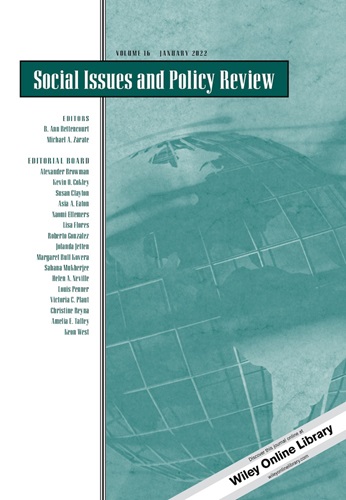进行社会心理干预以缩小教育成就差距的理论、伦理和政策考虑
IF 5.6
1区 心理学
Q1 PSYCHOLOGY, SOCIAL
引用次数: 28
摘要
教育中的社会心理学干预作为一种简单、廉价、有力的方法,通过帮助表现不佳的学生实现他们的潜力,来改善教育公平和包容,已经显示出显著的前景。这些发现导致了深入的研究和复制尝试,以理解和缩小规模上的成就差距。在目前的回顾中,我们确定了这项工作提出的几个重要问题,这些问题与使用这些干预措施来缩小成就差距的理论、伦理和政策含义有关。利用经典和现代的威胁和表现模型,我们提出了一个区域威胁模型,以预测教育中的社会心理干预何时可能对特定学生产生积极、无效和消极的影响。根据这一分析,我们从道德的角度认为,为了减少适得其反的影响,干预措施应该集中在优化学生心理威胁的显著性上,而不是统一地减少它。作为一个长期的政策目标,干预研究应该遵循一个两步的过程,首先诊断学生的个人威胁水平,然后根据他们的威胁水平为学生量身定制干预措施。讨论了所提出的框架的实践和理论意义。本文章由计算机程序翻译,如有差异,请以英文原文为准。
Theoretical, Ethical, and Policy Considerations for Conducting Social–Psychological Interventions to Close Educational Achievement Gaps
Social–psychological interventions in education have shown remarkable promise as brief, inexpensive, and powerful methods for improving educational equity and inclusion by helping underperforming students realize their potential. These findings have led to intensive study and replication attempts to understand and close achievement gaps at scale. In the present review, we identify several significant issues this work has raised that bear on the theoretical, ethical, and policy implications of using these interventions to close achievement gaps. Using both classic and contemporary models of threat and performance, we propose a Zone Model of Threat to predict when social–psychological interventions in education may yield positive, null, and negative effects for specific students. From this analysis, we argue from an ethical standpoint that to reduce backfire effects, interventions should be focused on optimizing the salience of psychological threat across students rather than on uniformly reducing it. As a long-term policy goal, intervention studies should follow a two-step process, in which students’ individual levels of threat are first diagnosed and then interventions are tailored to the students based on their threat levels. Practical and theoretical implications of the proposed framework are discussed.
求助全文
通过发布文献求助,成功后即可免费获取论文全文。
去求助
来源期刊

Social Issues and Policy Review
Multiple-
CiteScore
22.20
自引率
1.10%
发文量
9
期刊介绍:
The mission of Social Issues and Policy Review (SIPR) is to provide state of the art and timely theoretical and empirical reviews of topics and programs of research that are directly relevant to understanding and addressing social issues and public policy.Papers will be accessible and relevant to a broad audience and will normally be based on a program of research. Works in SIPR will represent perspectives directly relevant to the psychological study of social issues and public policy. Contributions are expected to be review papers that present a strong scholarly foundation and consider how research and theory can inform social issues and policy or articulate the implication of social issues and public policy for theory and research.
 求助内容:
求助内容: 应助结果提醒方式:
应助结果提醒方式:


